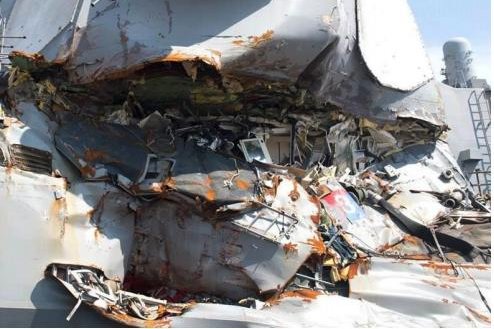1 of 2 | A photo of the exterior of the commanding officer's stateroom on the USS Fitzgerald following a collision earlier this year. Photo courtesy of the U.S. Navy
Nov. 1 (UPI) -- The U.S. Navy has concluded that two collisions between Navy destroyers and commercial vessels earlier this year were "avoidable," and were the result of multiple human errors in a report published Wednesday morning.
The Navy concluded in its report, released Wednesday, that the crew and leadership on board failed to plan for safety, habitually committed basic navigational errors and were ineffective at using onboard navigational tools to respond adequately to the pending collision with the commercial vessels.
"Many of the decisions made that led to this incident were the result of poor judgment and decision making of the commanding officer," the report said. "That said, no single person bears full responsibility for this incident. The crew was unprepared for the situation in which they found themselves through a lack of preparation, ineffective command and control, and deficiencies in training and preparations for navigation."
The USS John S. McCain, a guided missile destroyer named after Arizona Sen. John McCain's grandfather and father, both of whom were Navy four-star admirals, was involved in a collision with the merchant oil tanker Alnic MC on Aug. 21., near Singapore. The wreck claimed the lives of 10 U.S. Navy Sailors and injured five more with extensive damage to both ships.
The August crash of the McCain came less than two months after another Seventh Fleet ship, the guided-missile destroyer USS Fitzgerald, collided with a container ship in Tokyo Bay, leaving seven U.S. sailors dead.
Investigators found that naval officers on the USS Fitzgerald possessed an "unsatisfactory level of knowledge of the International Rules of the Nautical Road," and that "watch team members were not familiar with basic radar fundamentals, impeding effective use."
For the USS John S. McCain, a "loss of situational awareness" and corresponding mistakes while operating the ship's steering and propulsion system contributed to the ultimate crash, the investigators report.
The Navy's report follows the firing of two top Naval officers from their positions on the USS John S. McCain back in October, with Cmdr. Alfredo J. Sanchez, the commanding officer of the Arleigh Burke class destroyer, and his executive officer, Cmdr. Jessie L. Sanchez. Both were relieved of their duties by Navy Vice Adm. Phil Sawyer, the commander of the Navy's Seventh Fleet, "due to a loss of confidence" and reassigned.
The Navy reports that the command leadership's schedule on the USS Fitzgerald fatigued the crew prior to the collision and that leadership failed to assess the risks of fatigue and implement mitigation measures to ensure adequate crew rest.
On the McCain, the report states that "leadership failed to provide the appropriate amount of supervision in constructing watch assignments for the evolution by failing to assign sufficient experienced officers to duties."
The McCain and Fitzgerald collisions have spotlighted issues in the Navy's Seventh Fleet, headquartered out of Japan, as the wrecks underscore leadership failures and the corrosion of training standards, based on Congressional testimony alluding to naval crews being overworked and spread thin.
In September, the Government Accountability Office reported that a reduction in Navy crew sizes was contributing to safety risks, with some sailors working over 100 hours a week.
Sen. John McCain, R-Ariz., chairman of the Senate Armed Services Committee, has called for an immediate end to U.S. sailors working over 100 hours a week as Navy leaders grapple with growing ship collisions and worn-out crews.
"I think I know what 100 hours a week does to people over time and that has been standard procedure for a long time," McCain said during a September hearing of the SASC focused on the collisions.
"I'm glad you've got RAND and whoever the hell else it is that is studying [the issue]... [but] you could make the change tomorrow," McCain added.
The publication of the Navy's report comes a day after the Navy held closed-door briefings for Congressional lawmakers on Capitol Hill on its findings and recommendations -- a broader review of the Seventh Fleet's operational tempo, training, equipment and maintenance is expected to be released on Thursday.
"In the Navy, the responsibility of the Commanding Officer for his or her ship is absolute. Many of the decisions made that led to this incident were the result of poor judgment and decision making of the Commanding Officer," investigators write in the report.
"That said, no single person bears full responsibility for this incident. The crew was unprepared for the situation in which they found themselves through a lack of preparation, ineffective command and control, and deficiencies in training and preparations for navigation."















